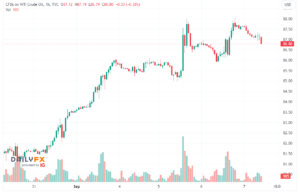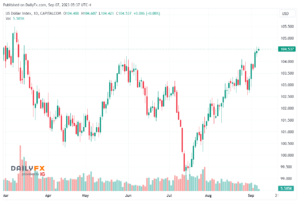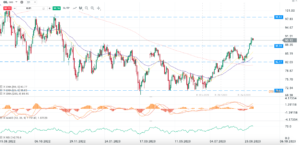-
Best Forex Brokers
Our top-rated Forex brokers
-
NGN Trading Accounts
Save on conversion fees
-
Brokers for Beginners
Start trading here
-
Forex Demo Accounts
Learn to trade with no risk
-
ECN Brokers
Trade with Direct Market Access
-
No-Deposit Bonuses
Live trading with no deposit
-
High Leverage Brokers
Extend your buying power
-
Lowest Spreads Brokers
Tight spreads and low commissions
-
Islamic Account Brokers
Best accounts for Muslim traders
-
Market Maker Brokers
Fixed spreads & instant execution
-
MetaTrader 4 Brokers
The top MT4 brokers in Nigeria
-
MetaTrader 5 Brokers
The top MT5 brokers in Nigeria
-
TradingView Brokers
The top TradingView brokers
-
cTrader Brokers
The top cTrader brokers in Nigeria
-
Forex Trading Apps
Trade on the go from your phone
-
Copy Trading Brokers
Copy professional traders
-
All Trading Platforms
Find a platform that works for you
Crude oil prices hit yearly highs on Tuesday, 5th September, as Russia and Saudi Arabia jointly announced an extension of production cuts agreed earlier in the year.

Saudi Arabia has cut 1 million b/d from its production since July. Originally touted as a temporary measure, the Kingdom now says it will hold the cuts in place until the end of the year. Similarly, Russia’s cuts of 300,000 b/d will also stay until the end of the year.
Bob McNally, president of Rapidan Energy and a former energy adviser to the White House, said, “barring a sharp economic downturn, these supply cuts will drive deep deficits into global oil balances and should propel crude oil prices well above $90 per barrel.”
Geopolitical consequences aside, the extension of the cuts raises questions for central banks in their efforts to tackle inflation, the US Federal Reserve in particular. The USD, as measured by the DXY index against a basket of currencies, has been on a bull run since mid-July, supported by strong US data and concerns over the Fed’s hawkish rhetoric on inflation.

Following Tuesday’s Saudi/Russian announcement, the DXY pushed close to its yearly high near 105.00. DXY prices were driven not only by the potential impact of high energy prices on interest rates but also by stronger-than-expected US Services PMI data and continued signs of a Chinese slowdown – boosting the USD’s haven status.
Through the summer, inflation has remained sticky in both the US and across Europe, with central banks threatening to hold interest rates higher for longer. Analysts are now seriously concerned about the long-term impact of higher interest rates on global economies, with growth forecasts for 2024 being scaled back in recent weeks. These concerns were already heightened before the surprise joint announcement by Russia and Saudi Arabia.
But with the spectre of higher energy prices into the new year, the chances of interest rates returning to normal anytime soon are slim.
While all of this may be bad news for consumers, it lends itself to continued USD support. The increased cost of energy may force the Fed to keep interest rates higher for longer, and any impact on global economic growth will only force more investors to the USD as a haven.
Technical Analysis
Oil tested the horizontal resistance level of 88.00 several times since the end of 2022, and as many analysts predicted, it broke through and hit the 90.00 level on Tuesday, 5th September. Trending well above all moving averages since they crossed mid-August 2023, and with the MACD cross-over confirming this bullish move since the end of August 2023, the uptrend seems set to continue. Although the RSI indicates that oil has entered oversold territory, the recent news out of Saudi Arabia and Russia will likely support the upward momentum.

Traders will be eyeing the 98.80 level last seen in November 2022, the next major resistance level, while immediate support is at the resistance-turned-support at 82.00.
































